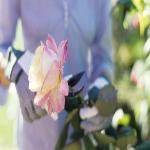
This is the VOA Special English Agriculture Report.
Most kinds of rose plants come from Asia. But roses are also native to other areas including northwest Africa, Europe and the United States.
In 1986, Congress chose the rose as America's national flower. Technically, Congress and President Ronald Reagan declared it the "national floral emblem." Whatever the name, the decision did not smell sweet to supporters of other popular flowers.
Some people say roses are difficult to grow. But you have a good chance of success if you start with a few suggestions from experts.
You should plant your roses where they can get sunshine for about six hours on bright days. You can buy roses from a garden center or by mail order. You can buy potted roses, also known as container roses, or bare-root plants. Each kind has its fans.
Some gardeners say potted roses are easier to plant. They say the roots develop better. But Jeffrey Dinslage, president of Nature Hills Nursery in Omaha, Nebraska, points out that bare-root roses come without soil. So they weigh less to transport.
The University of Illinois Extension advises getting bare-root roses as close to planting time as you can. If they arrive before you are ready to plant them, make sure the packing material is moist. Keep the plants in a cool, dark place.You plant the roses while they are dormant.
The resting plants have no leaves but still need water. When growing roses, the soil should feel moist deep down. Watering should be done in the morning. That can prevent problems called black spot and mildew.
But do not water too much. Jeffrey Dinslage says people often ask him about unhealthy discoloration on rose leaves. He says the spots are usually caused by too much water. After heavy rains or too much watering, he advises pulling away mulch temporarily from around the roots. This will help dry the soil.
In normal conditions, placing mulch around rose plants is a good idea. Mulch suppresses weeds and holds moisture in the soil. You can use mulch made from bark, pine needles, cottonseed or oak leaves.
If your soil is very dry, you can add peat or compost, which returns nutrients to the soil. If aphids, thrips or other insects invade your rose bushes, you may be able to force them off with just a strong spray of water.
And that's the VOA Special English Agriculture Report, written by Jerilyn Watson. Tell us about your experience with roses. You can write comments and read and listen to our reports at voaspecialenglish.com. I'm Jim Tedder.
mulch: material, for example, decaying leaves, that you put around a plant to protect its base and its roots, to improve the quality of the soil or to stop weeds growing 覆盖物,护根(用以保护植物根基、改善土质或防止杂草生长)
peat: a soft black or brown substance formed from decaying plants just under the surface of the ground, especially in cool wet areas. It can be burned as a fuel or used to improve garden soil. 泥煤;泥炭
aphid: a very small insect that is harmful to plants. There are several types of aphid, including, for example,greenfly. 蚜虫(体小,植物害虫)
thrip: (蓟马科的)吃植物的害虫
Farmers in East Africa struggle against cassava disease
A chicken in every pot: finding new uses for feathers
A cotton plant kills one kind of bug, but gets blamed for another
Why grafting still fits nicely into agriculture
(来源:VOA 编辑:陈丹妮)
